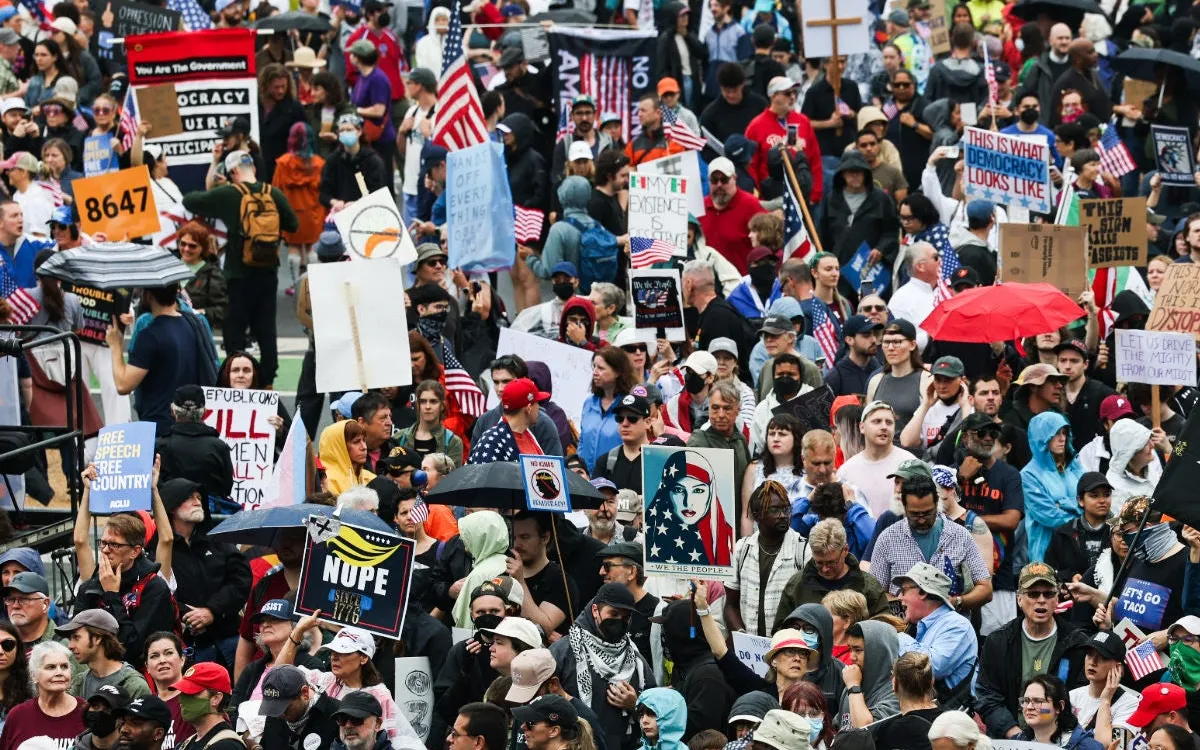
On Saturday, a significant gathering of demonstrators filled the Benjamin Franklin Parkway in Philadelphia for a peaceful protest against the policies of President Donald Trump and his administration. This event, part of the national "No Kings" movement, marked Philadelphia as a pivotal location, with organizers estimating that over 2,000 rallies took place across the country. This protest was notably the largest in the city during Trump's second term and was organized in response to a military parade held in Washington D.C. that same day.
The rally brought together a diverse group of individuals, each expressing a range of concerns about the administration's policies. Many participants highlighted issues related to the White House’s immigration policies, particularly the raids conducted by federal immigration officers. Protesters carried a variety of signs, with messages such as “Make oligarchy go away,” “No faux king way,” and “Stop kidnapping our neighbors.” Anu Joshi, the national campaign director for immigration at the American Civil Liberties Union (ACLU), emphasized that the public's outrage stems from witnessing the “cruelty” of U.S. Immigration and Customs Enforcement (ICE) actions.
Among the protesters was Jon Cutler, a 69-year-old Navy veteran from Philadelphia, who expressed his discontent with the administration's treatment of military heroes. “I raised my right hand to serve my nation... What really turned me against this administration was when he criticized John McCain, who was a hero,” Cutler remarked. His sentiments echoed a broader frustration among veterans regarding the administration's perceived lack of respect for military service and the Constitution.
Another veteran, 84-year-old James Higgins from Delaware, voiced concerns about recent layoffs at the U.S. Department of Veterans Affairs, stating that the White House is “moving towards a dictatorship.” He criticized the military parade as an inappropriate display of power, arguing that such celebrations should occur in a controlled environment rather than in public.
The protest also attracted activists advocating for social justice. Mike Madera, a 28-year-old from West Philadelphia, joined a pro-Palestine contingent, asserting that real progress cannot occur without addressing the plight of Palestinians. Lauren Gauthier, a 46-year-old from Phoenixville, emphasized her moral obligation to stand up for vulnerable populations affected by Trump’s policies, including immigrants and the LGBTQ+ community.
“The treatment of vulnerable people is what tugs at my heartstrings,” Gauthier stated, highlighting the importance of using her privilege to advocate for those less fortunate. Her companion, a transgender man who preferred to remain anonymous due to safety concerns, shared his struggles with family members who support Trump, attributing this divide to the influence of right-wing media.
The protest drew participants from beyond the local region, including Casey Holden, 27, who traveled from Covington, Louisiana. She expressed her alarm at what she sees as the “beginning stages” of authoritarianism in America. Holden stated her desire to connect with like-minded individuals at the Philadelphia protest, noting the prevalence of Trump signs in her home state.
Jonathan and Jennifer Riehl, members of the Union of Concerned Scientists, brought their daughter to the protest to instill a sense of community and activism. “She’s here because I want her to see we’re not alone,” Jennifer said, emphasizing the importance of nonviolent action in making a difference.
Interestingly, many protesters chose to carry American flags, contrasting previous rallies that prominently featured flags from other nations. James Seibert, a 50-year-old from Cherry Hill, New Jersey, explained that he wanted to present “an American face” to the resistance against Trump, aiming to foster a sense of unity among residents of Philadelphia and the broader region.
Kathy Miller, a therapist from Germantown, highlighted the mental health implications of the current administration’s actions, noting that many of her clients are experiencing heightened trauma due to political developments. Pamela Gayles-Butler, a teacher from Camden, voiced her concerns regarding cuts to critical social programs, including Medicare and education funding, expressing disappointment in Congress’s complicity with Trump’s agenda.
During the rally, representatives like Jamie Raskin spoke passionately about the need for the public to engage and resist. Raskin pointed out that Philadelphia is a fitting location for such movements, given its historical significance in America's fight for freedom. “We get to be founding fighters in the 21st century,” he proclaimed, urging attendees to take collective action.
As the protest concluded, Joshi of the ACLU reminded everyone that the responsibility to enact change lies with the people. “It’s going to take millions of people in the streets organizing in their communities,” she asserted, underscoring the importance of grassroots activism in shaping the future of the nation.